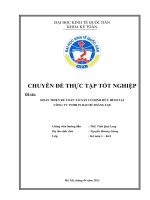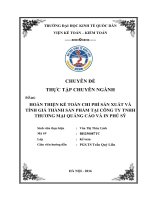Chronic Fatigue Syndrome in Traditional Chinese Medicine
Bạn đang xem bản rút gọn của tài liệu. Xem và tải ngay bản đầy đủ của tài liệu tại đây (153.01 KB, 30 trang )
ME
& Chinese Medicine Treatment
Huijun Shen
Senior lecturer
Acupuncture Programme
University of Lincoln
ME:
TCM Understanding
TCM Name: Xu Lao
• Xu: Deficiency
• Lao: Fatigue
Core Etiology & pathogenesis:
• Damp retention, and
• Qi deficiency
What is damp retention
• An abnormal accumulation of body fluids,
which affect the physical functions of
organs (most commonly spleen), tissues
(muscles etc) and cells, leading to
dysfunction of cellular metabolism.
• Damp: intercellular accumulation of body
fluids?
Where does damp retention come from?
Damp retention leading to Spleen dysfunction
• Spleen has the function in transformation and
transportation of food essence to produce Qi
Exogenous Damp:
Damp environment,
damp weather, etc.
Damp
accumulating
in Middle Jiao
Endogenous
damp:
Cold food/
unhealthy diet
Spleen
Dysfunction
Xu Lao
What is Qi Deficiency?
• Qi: life force, vital energy
• Qi deficiency: Qi becomes weaker than
normal leading to lessened energy level in
the body, manifesting as fatigue/lethargy,
weak muscles, poor appetite, weak voice,
pale tongue and weak pulse.
Where does Qi Deficiency come from?
Typical Qi Deficiency is Spleen Qi Deficiency
Congenital
Weakness
Too little
production
long term illness
erratic diet
malnutrition
Too much
consumption
long term illness
overwork
Spleen Deficiency
- Failing to
produce Qi, Qi
becomes weak
Spleen Qi Deficiency failing to transform
and transport body
fluids, leading to
Damp retention
Damp Retention vs
Spleen Qi Deficiency
mutually causative
mutually consequent
Damp
Retention
Spleen Qi
Deficiency
A. Early stage: predominantly excess
patterns
• Damp accumulated in the interior
1. Damp heat accumulated in the interior
• Main symptoms:
• feeling slightly hot but no fever, sweating, thirst
but no desire for drinking;
• distension/fullness in abdomen, with dull pain,
poor appetite, erratic bowel movement or
diarrhoea, nausea, vomiting;
• red tongue with yellow greasy coating, rapid soft
pulse.
• Treatment principles: Clear damp heat
• Herbal formulae: San Ren Tang
• Herbal prescription: Xing Ren, Sha Ren,
Yi Yi Ren, Huan Qin, Zhi Zi, Bai Zhu, Chen
Pi, Gan Cao
• Point selection: GB34, SP9, ST38, ST25,
LI11
• 2. Damp cold accumulated in the interior
• Main symptoms: feeling cold, no or little
sweating, no desire for drinking,
distension/fullness in abdomen, poor appetite,
nausea, erratic bowel movement or diarrhoea,
pale tongue with white greasy coating, slow soft
(soggy) pulse
• Treatment principles: expel cold and remove
damp
• Point selection: GB34, SP4, SP6, SP9, ST36,
ST38, ST25, Ren 12, Ren6, or moxa
• Treatment principles: expel cold and
remove damp
• Herbal formulae: Ping Wei San with Huo
Zhu Wan
• Herbal prescription: Cang Zhu, Hou Po,
Chen Pi, Sha Ren, Yi Yi Ren, Huo Xiang,
Bai Zhu, Gan Cao, Fu Ling,
• Point selection: GB34, SP4, SP6, SP9,
ST36, ST38, ST25, Ren 12, Ren6, or
moxa
• 3. Damp /phlegm retention combined with Liver Qi
stagnation
• Main symptoms:
• no feeling cold or hot
• distension/fullness in abdomen, or abdominal pain
• poor appetite, nausea
• or fullness in chest with cough and phlegm
• erratic bowel movement or diarrhoea
• irregular or painful menstruation
• irritability, frequent sighing
• pale tongue with white greasy coating, pulse soft in
spleen position and wiring in liver position
• Treatment principles: remove damp/phlegm
and spread liver qi
• Herbal formulae: Er Chen Tang with Si Ni San
• Herbal prescription: Chen Pi, Ban Xia, Fu Ling,
Gan Cao; Chai Hu, Bai Shao Yao, Zhi Shi; plus
Qing Pi, Yu Jin, Xing Ren.
• Point selection: Liv3 (or with LI4), GB34, SP4,
SP6, SP9, ST36, ST40, ST25, Ren 12, Ren6,
Liv13, Liv14.
B. Middle Stage: predominantly
deficiency patterns
• 1. Qi deficiency mingled with damp
• Main symptoms: Fatigue, low energy
level, poor appetite, loose stools or even
diarrhoea, weight loss, pale tongue with
teeth marks on the tongue edge, weak
pulse.
• Treatment principles: tonify spleen Qi
and remove damp
• Herbal formulae:
• Herbal prescription:
• Point selection: ST36, SP3, SP6, SP9,
Ren 6, Ren 12, BL20
• 2. Qi and blood deficiency
• Main symptoms: Fatigue, low energy
level, pale complexion, poor appetite,
loose stools or even diarrhoea, more
obvious weight loss, abnormal
menstruation in women, dizziness when
feeling tired, numbness in limbs, blurred
vision, pale tongue and weak pulse.
• Treatment principles: Tonify Qi and
nourish blood
• Herbal formulae: Ba Zhen Tang
• Herbal prescription: Dang Sehn, Bai Zhu,
Fu Ling, Gan Cao; Dang Gui, Bai Shao
Yao, Shu Di Huang, Chuan Xiong; Huang
Qi, Shan Yao, He Shou Wu can be added.
• Point selection: ST36, SP6, SP10 Ren 6,
BL17, BL18, BL20.
• 3. Yin deficiency
• Main symptoms: Feeling hot or hot
flushes, night sweats, dry mouth and
thirst, “five palm heat”, weight loss, fatigue,
red tongue with little coating, weak/thin
and rapid pulse.
• Treatment principles: Nourish Yin
• Herbal formulae: Liu Wei Di Huang Wan
plus
• Herbal prescription: Shu Di Huang, Shan
Yao, Shan Zhu Yu, Mu Dan Pi, Ze Xie, Fu
Ling; Mai Men Dong, Nu Zhen Zi, Gou Qi
Zi, Tai Zi Shen can be added
• Point selection: SP6, BL18, BL23, Ren4;
KI2, 6 or 7
• 4. Yang deficiency
• Main symptoms: Feeling cold with cold
hands and feet, lack of sweats, weight
loss, very tired with low energy, obvious
general weakness, loose stools or
diarrhoea, frequent urination, pale or
purple tongue, deep weak pulse.
• Treatment principles: tonify Yang
• Herbal formulae: modified Jing Gui Shen Qi
Wan
• Herbal prescription: Xian Mao (as substitute of
Fu Zi), Rou Gui, Shu Di Huang, Shao Yao, Shan
Zhu Yu, Mu Dang Pi, Ze Xie, Fu Ling; Tu Si Zi,
Ba Ji Tian can be added.
• Point selection: KI3, 6, 7; BL20, 23; Ren4, 6;
DU4, ST36
C. Later Stage: predominantly multiple
deficiency patterns
• 1. Qi and Yin dual deficiency
• Main symptoms: Extreme weakness,
feeling hot or hot flushes, night sweats,
dry mouth and thirst, “five palm heat”,
weight loss, fatigue, poor appetite, erratic
bowel movement, red tongue with teeth
marks, little tongue coating, weak, thin and
rapid pulse.
• Treatment principles: Tonify Qi and nourish Yin
• Herbal formulae: Bao Yuan Jian with Liu Wei
Di Huang Wan
• Herbal prescription: Dang Shen, Bai Zhu,
Huang Qi, Fu Ling, Chen Pi, Gan Cao; Shu Di
Huang, Shan Yao, Shan Zhu Yu, Mu Dan Pi, Ze
Xie; or Sheng Mai Yin (Ren Shen, Mai Men
Dong, Wu Wei Zi) can be added.
• Point selection: ST36, SP6, BL18, BL20, BL23,
Ren 4 Ren 6; KI 2, 3, 6 or 7
• 2. Yin and Yang dual deficiency
• Main symptoms: Extreme weakness, no
hot or cold feeling, or feeling warm/hot in
the afternoon but cold at night or in the
morning, night sweats and spontaneous
sweats, severe weight loss, very poor
appetite, deep and very thin/weak pulse.
• Treatment principles: tonify Yang and nourish
Yin
• Herbal formulae: Liu Wei Di Huang Wan with
Zhen Wu Tang
• Herbal prescription: Shu Di Huang, Shan Yao,
Shan Zhu Yu, Mu Dan Pi, Ze Xie, Fu Ling; Fu Zi
(substituted by Xiao Mao), Gan Jiang, Bai Zhu,
Bai Shao Yao; Rou Gui, Ba Ji Tian can be
added.
• Point selection: SP6, ST36, BL18, BL20, BL23,
Ren4; KI2, 3, 6 or 7; Ren4, 6; DU4









